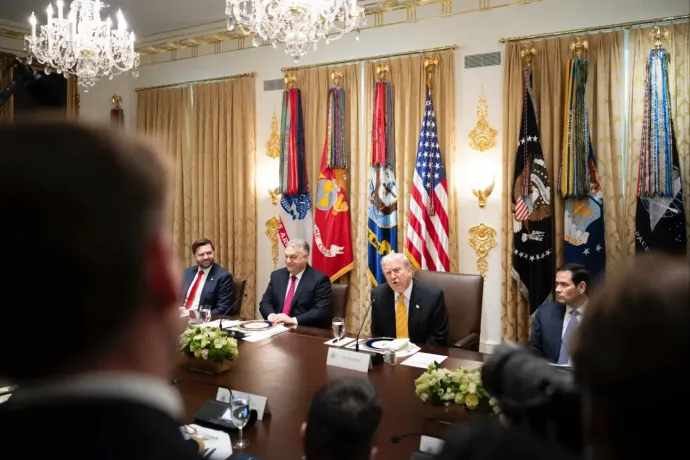Rubio says Hungary given exemption from sanctions on Russian oil and gas for a year

"In the case of the pipelines on oil and gas, it's a one-year extension, because it would be deeply traumatic to their economy to cut them off immediately," US Secretary of State Marco Rubio said in response to a reporter's question.
Citing a White House official, CNN had previously reported that Donald Trump had granted Hungary a one-year waiver from US sanctions on Russian oil and gas purchases, and both the BBC and Reuters sources reported the same. The White House confirmed this information to Telex as well.
However, the Hungarian government has continued to insist that we were granted an exemption for an unlimited period of time, as Viktor Orbán told Egon Rónai on ATV. Rubio's recent statement, which can be viewed here, contradicts this, with the relevant section starting at 32:23:
In response to Rubio's statement, at Thursday's government briefing, Minister of the Prime Minister's Office, Gergely Gulyás said that during the Washington talks it was not mentioned that the exemption would be for a period of one year. According to him, while "there may be such information coming from the US State Department now," this was not mentioned during the talks in Washington.
Gulyás said that Orbán and Trump agreed that Hungary would receive an exemption from US sanctions without a time limit. Gulyás also said that the two governments would clarify the agreement through official channels, and that Foreign Minister Szijjártó would be contacting Rubio in the coming days. The minister was unable to say exactly when the agreement would be signed, but the government expects it to happen before the sanctions take effect.
We have sent questions about Marco Rubio's statement to the Hungarian government's Information Center and the Ministry of Foreign Affairs and Trade, and we will report back as soon as we receive a response.
According to experts Telex spoke with, by the middle of 2027, Mol's refineries will be able to operate at maximum capacity with off-shore oil, so from this perspective, the company should be able to meet the one-year deadline. The only alternative to the Druzhba pipeline is the Adria or Janaf pipeline from Croatia, which transports crude oil to Hungary, but there is a difference of opinion between Mol and the operator Janaf as to whether this pipeline can meet the country's entire demand. However, the debate is largely theoretical, as the parties have never attempted to transport enough oil through the Adria pipeline to replace Russian sources.
After the Orbán-Trump meeting over the weekend, Viktor Orbán announced that the United States would grant Hungary complete exemption from US sanctions on Russian oil and natural gas as relating to the Turkish Stream and Friendship pipelines. Hungary will purchase nuclear fuel from Westinghouse, thus paving the way for the introduction of small American modular reactors in Hungary.
US sanctions affecting the construction of the Paks II power plant will be lifted in their entirety, but no agreement has been reached on the restoration of the double taxation agreement. Orbán later met separately with US Vice President J. D. Vance.
For more quick, accurate and impartial news from and about Hungary, subscribe to the Telex English newsletter!